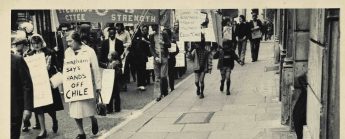Laura Carter is a PhD student at Trinity Hall, Cambridge, working on popular history, education, and museums in mid-twentieth century Britain. You can follow here on Twitter @carter740.
I only made it to the MBS conference for one day. But it was a stimulating and memorable day, a welcome prelude to a pretty uneventful summer of writing. I emerged at the end of the day on 3 July feeling optimistic and invigorated (although perhaps that was because I missed the hard truths session at the graduate workshop on day one).
A major theme that emerged out of MBS was ‘everyday life’. (I tried to read all of the #mbs2015 twitter references to it, but my finger got achy from scrolling.) I’ve been thinking about everyday life pretty much every day of my life since I started my PhD, which uses the ‘history of everyday life’ as a way of isolating certain modes of popular ‘social’ history in Britain from the 1920s-1960s.
So, naturally, I find the use of this vocabulary amongst social and cultural historians of modern Britain in the present an intriguing postscript to my research. As far as I can tell, ‘everyday life’ is a relatively recent trend in the history-academic context. I started hoarding ‘everyday life’ references in the titles of recent publications a while back. Trust me, it’s gone viral.
Rather than (only) self-satisfyingly pointing out how this phrase has been used differently by historians over the last 200 years for multiple purposes (sometimes progressive, sometimes paternalistic or reactionary), I co-organised a one-day symposium on ‘Everyday Life’ last September (you can read our reviews of it here), to try and get to the bottom of what we mean now when we talk about doing the history of everyday life.
We were fortunate enough to have Joe Moran speak. His inspired work has emphasised the mess and randomness of the everyday, it refuses the safe determinism that characterized an older mode of social history. On the day, Joe emphasised the myriad aesthetic and literary origins of his interest in everyday life. Ultimately, the range and dynamism of our symposium probably sparked more questions than it answered…
MBS working paper #1 presented everyday life as a point of access to democratic cultures in nineteenth and twentieth-century Britain that were formally structured by inequalities. This seemed plausible and pretty uncontroversial. What became clear to me at the conference, however, was the potential conflict that the phraseology ‘everyday life’ could provoke over the direction of social and cultural history. Is everyday life in danger of being so pointlessly micro, so highly personalized (read devoid of class), that it becomes, dare I say it, an ‘individualistic’ approach to history? Surely, such an approach scales down our histories too much and thus robs history of its big, schematic, explanatory functions?
This damning charge was heartily invalidated in both the panel on the 1970s and by Deborah Cohen in her keynote (and in the closing plenary roundtable). Deborah talked convincingly about making the global ‘beholden’ to the everyday, whilst Nathalie Thomlinson posited the everyday as an optic through which to discover the relationship between the narrative of ‘feminist awakenings’ and the experience of social change in the 1970s. The research showcased by this array of talented female historians demonstrated that assuming that using everyday life in history is just a capitulation to Thatcherism would be too easy.
Everyday life does useful work: comparative work, linguistic work, emotional work, and political work. It bridges the individual and the collective, the vernacular and the official. Everyday life provides the historian with a tool to access, in a necessarily limited way, the subjectivities in people’s negotiation of social and political change in the past. We actually need it to do social history. (Arguably, more than ever, to do the social history of Britain from the 1970s to the present day.)
So my day at MBS dually rewarded me with some clarity on what writing the history of everyday life means today, or at the very least it clarified where some battlelines might be drawn. One puzzle I was left with, and probably one that further discussions will address, was about the relationship between the history of everyday life and the history of emotions (another big MBS beast, see Charlotte Greenhalgh’s blog).
Sadly, I didn’t see the history of emotions panel, but I have since caught Claire Langhamer’s talk at the IHR a few days earlier (via podcast) on ‘Feelings at Work in the Long 1950s’, in which she tellingly described Mass-Observation sources as ‘rich with everyday theorization’. Emotions are certainly part of everyday life, but do they define it, and is it possible any longer to talk about a history of everyday life without emotional theorization? Answers in a tweet please.


One thought on “Laura Carter: One day and the everyday at MBS2015”